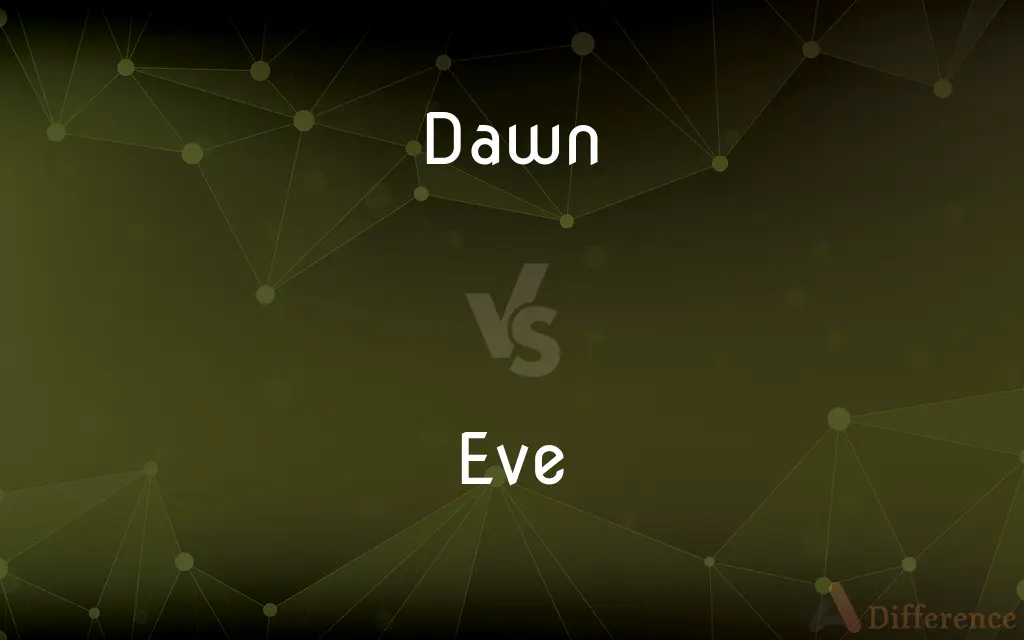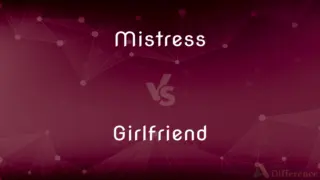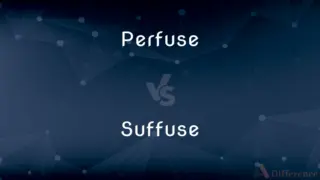Dawn vs. Eve — What's the Difference?

Difference Between Dawn and Eve
ADVERTISEMENT
Compare with Definitions
Dawn
Dawn is the time that marks the beginning of twilight before sunrise. It is recognized by the appearance of indirect sunlight being scattered in Earth's atmosphere, when the centre of the Sun's disc has reached 18° below the observer's horizon.
Eve
Eve (; Hebrew: חַוָּה, Chava /χaˈva/, Tiberian: Ḥawwāh; Arabic: حَوَّاء, romanized: Ḥawwāʾ; Greek: Εὕα, romanized: Heúa; Latin: Eva, Heva; Syriac: ܚܰܘܳܐ romanized: ḥawâ) is a figure in the Book of Genesis in the Hebrew Bible and the Quran. According to the origin story of the Abrahamic religions, she was the first woman, yet some debate within Judaism has also given that position to Lilith.
Dawn
The time each morning at which daylight first begins.
Eve
The evening or day preceding a special day, such as a holiday.
Dawn
A first appearance; a beginning
The dawn of history.
ADVERTISEMENT
Eve
The period immediately preceding a certain event
The eve of war.
Dawn
To begin to become light in the morning.
Eve
Evening.
Dawn
To begin to appear or develop; emerge.
Eve
The day or night before, usually used for holidays, such as Christmas Eve.
Dawn
To begin to be perceived or understood
Realization of the danger soon dawned on us.
Eve
Evening, night.
Dawn
(intransitive) To begin to brighten with daylight.
A new day dawns.
Eve
(figurative) The period of time when something is just about to happen or to be introduced
The eve of a scientific discovery
Dawn
(intransitive) To start to appear or be realized.
I don’t want to be there when the truth dawns on him.
Eve
Evening.
Winter oft, at eve resumes the breeze.
Dawn
(intransitive) To begin to give promise; to begin to appear or to expand.
Eve
The evening before a holiday, - from the Jewish mode of reckoning the day as beginning at sunset, not at midnight; as, Christmas eve is the evening before Christmas; also, the period immediately preceding some important event.
Dawn
(uncountable) The morning twilight period immediately before sunrise.
Eve
(Old Testament) Adam's wife in Judeo-Christian mythology: the first woman and mother of the human race; God created Eve from Adam's rib and placed Adam and Eve in the Garden of Eden
Dawn
(countable) The rising of the sun.
Eve
The day before;
He always arrives on the eve of her departure
Dawn
(uncountable) The time when the sun rises.
She rose before dawn to meet the train.
Eve
The period immediately before something;
On the eve of the French Revolution
Dawn
(uncountable) The earliest phase of something.
The dawn of civilization
Eve
The latter part of the day (the period of decreasing daylight from late afternoon until nightfall);
He enjoyed the evening light across the lake
Dawn
To begin to grow light in the morning; to grow light; to break, or begin to appear; as, the day dawns; the morning dawns.
In the end of the Sabbath, as it began to dawn toward the first day of the week, came Mary Magdalene . . . to see the sepulcher.
Dawn
To began to give promise; to begin to appear or to expand.
When life awakes, and dawns at every line.
Dawn on our darkness and lend us thine aid.
Dawn
The break of day; the first appearance of light in the morning; show of approaching sunrise.
And oft at dawn, deep noon, or falling eve.
No sun, no moon, no morn, no noon,No dawn, no dusk, no proper time of day.
Dawn
First opening or expansion; first appearance; beginning; rise.
These tender circumstances diffuse a dawn of serenity over the soul.
Dawn
The first light of day;
We got up before dawn
They talked until morning
Dawn
The earliest period;
The dawn of civilization
The morning of the world
Dawn
An opening time period;
It was the dawn of the Roman Empire
Dawn
Become clear or enter one's consciousness or emotions;
It dawned on him that she had betrayed him
She was penetrated with sorrow
Dawn
Appear or develop;
The age of computers had dawned
Dawn
Become light;
It started to dawn, and we had to get up
Share Your Discovery

Previous Comparison
Mistress vs. Girlfriend
Next Comparison
Perfuse vs. Suffuse














































